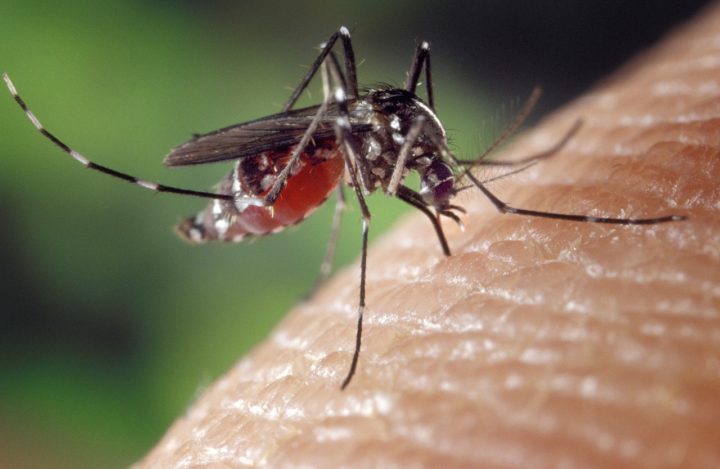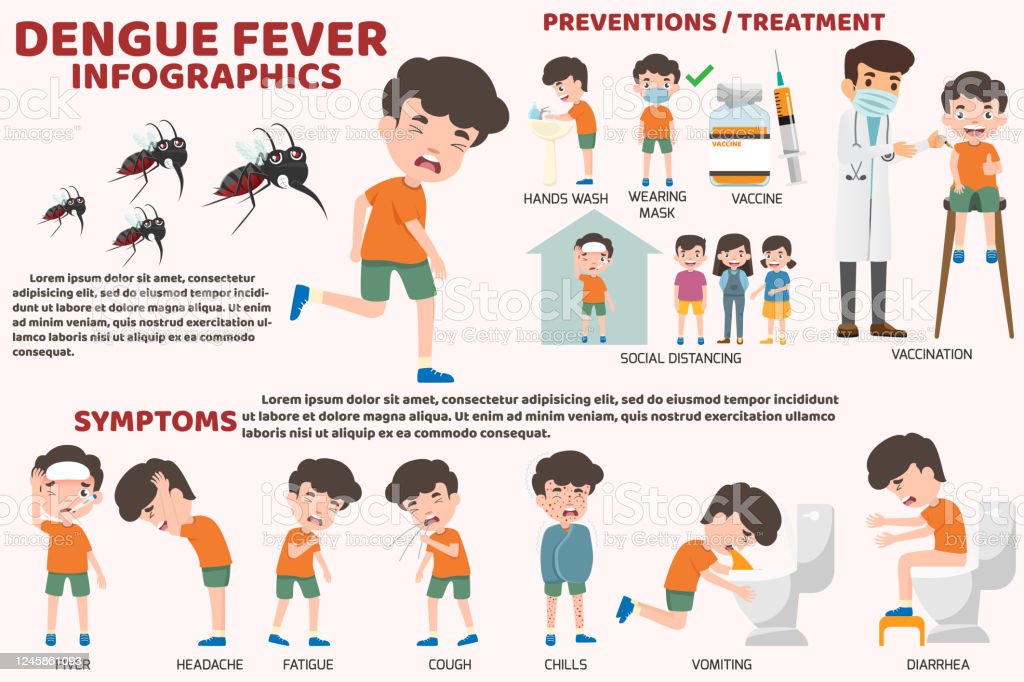
What is Dengue Fever? : How to protected from them ?
Dengue fever is a mosquito-borne tropical disease caused by the dengue virus. Symptoms typically begin three to fourteen days after infection. These may include a high fever, headache, vomiting, muscle and joint pains, and a characteristic skin itching and skin rash.
Recovery generally takes two to seven days. In a small proportion of cases, the disease develops into a more severe dengue hemorrhagic fever, resulting in bleeding, low levels of blood platelets and blood plasma leakage, or into dengue shock syndrome, where dangerously low blood pressure occurs.
Dengue is spread by several species of female mosquitoes of the Aedes genus, principally Aedes aegypti. The virus has five serotypes; infection with one type usually gives lifelong immunity to that type, but only short-term immunity to the others.
Subsequent infection with a different type increases the risk of severe complications. A number of tests are available to confirm the diagnosis including detecting antibodies to the virus or its RNA.
Key Facts
- 1 in 4: About one in four people infected with dengue will get sick.
- For people who get sick with dengue, symptoms can be mild or severe.
- Severe dengue can be life-threatening within a few hours and often requires care at a hospital.
Symptoms

Symptoms, which usually begin four to six days after infection and last for up to 10 days, may include
- Sudden, high fever
- Severe headaches
- Pain behind the eyes
- Severe joint and muscle pain
- Fatigue
- Nausea
- Vomiting
- Skin rash, which appears two to five days after the onset of fever
- Mild bleeding (such a nose bleed, bleeding gums, or easy bruising)
Sometimes, symptoms are mild and can be mistaken for those of the flu or another viral infection. Younger children and people who have never had the infection before tend to have milder cases than older children and adults. However, serious problems can develop.
These include dengue hemorrhagic fever, a rare complication characterized by high fever, damage to lymph and blood vessels, bleeding from the nose and gums, enlargement of the liver, and failure of the circulatory system. The symptoms may progress to massive bleeding, shock, and death. This is called dengue shock syndrome (DSS).
People with weakened immune systems as well as those with a second or subsequent dengue infection are believed to be at greater risk for developing dengue hemorrhagic fever.
Treatment for Dengue Fever

No specific treatment for dengue fever exists.
While recovering from dengue fever, drink plenty of fluids. Call your doctor right away if you have any of the following signs and symptoms of dehydration:
- Decreased urination
- Few or no tears
- Dry mouth or lips
- Lethargy or confusion
- Cold or clammy extremities
The over-the-counter (OTC) drug acetaminophen (Tylenol, others) can help reduce muscle pain and fever. But if you have dengue fever, you should avoid other OTC pain relievers, including aspirin, ibuprofen (Advil, Motrin IB, others) and naproxen sodium (Aleve). These pain relievers can increase the risk of dengue fever bleeding complications.
If you have severe dengue fever, you may need:
- Supportive care in a hospital
- Intravenous (IV) fluid and electrolyte replacement
- Blood pressure monitoring
- Transfusion to replace blood loss
Preventing Dengue Fever
The best way to prevent the disease is to prevent bites by infected mosquitoes, particularly if you are living in or traveling to a tropical area. This involves protecting yourself and making efforts to keep the mosquito population down. In 2019, the FDA approved a vaccine called Dengvaxia to help prevent the disease from occurring in adolescents aged 9 to 16 who have already been infected by dengue. But, there currently is no vaccine to prevent the general population from contracting it.
To protect yourself:
- Use mosquito repellents, even indoors.
- When outdoors, wear long-sleeved shirts and long pants tucked into socks.
- When indoors, use air conditioning if available.
- Make sure window and door screens are secure and free of holes. If sleeping areas are not screened or air conditioned, use mosquito nets.
- If you have symptoms of dengue, speak to your doctor.
To reduce the mosquito population, get rid of places where mosquitoes can breed. These include old tires, cans, or flower pots that collect rain. Regularly change the water in outdoor bird baths and pets’ water dishes.
If someone in your home gets dengue fever, be especially vigilant about efforts to protect yourself and other family members from mosquitoes. Mosquitoes that bite the infected family member could spread the infection to others in your home.
Can Dengue Fever Be Prevented for Parents?
A dengue vaccine is recommended for kids and teens 9–16 years old who have already had dengue fever and who live in the U.S. territories where it is common. It is not recommended for travelers to these areas. But the vaccine is not enough on its own. Preventing mosquito bites is still very important protection. Be sure to:
- Use screens on doors and windows, and promptly repair broken or damaged screens. Keep unscreened doors and windows shut.
- Have kids wear long-sleeved shirts, long pants, shoes, and socks when they go outside, and use mosquito netting over their beds at night.
- Use insect repellent as directed on kids. Choose one with DEET or oil of lemon eucalyptus.
- Limit the amount of time kids spend outside during the day, especially in the hours around dawn and dusk, when mosquitoes are most active.
- Don’t give mosquitoes places to breed. They lay their eggs in water, so get rid of standing water in things like containers and discarded tires, and be sure to change the water in birdbaths, dog bowls, and flower vases at least once a week.
By taking these precautions and keeping your family away from areas with dengue fever outbreaks, the risk of dengue fever is small for international travelers.
Source : www.webmd.com , kidshealth.org

တို့အတူတူ ရင်ဆိုင်မယ်
So grateful 💖
Wonderful beat ! I wish to apprentice while you amend your web site, how could i subscribe for a blog web site? The account aided me a acceptable deal. I had been a little bit acquainted of this your broadcast provided bright clear idea
먹튀검증 2025: 안전놀이터 선택의 필수 가이드
Thank you for the auspicious writeup. It in fact was a amusement account it. Look advanced to more added agreeable from you! By the way, how could we communicate?
Hi my loved one! I wish to say that this post is amazing, nice written and include approximately all vital infos. I’d like to peer more posts like this.
Thanks much for your kind effort 😊
Thanks lots for sharing precious health knowledge.
먹튀검증으로 토토사이트와 온라인 카지노사이트 먹튀 피해를 예방하는 먹튀검증사이트
I just wanted to take a moment to say how much I appreciate your blog posts. They’re always well-written, informative, and keep me coming back for more. Keep up the great work!
ဟတ်ချလောင်းးး
ခြင်မုန်းတယ် ခြင်ကိုက်ရက်အိပ်မရဘူး အရမ်းစိတ်နှောင့်အယှက်ဖြစ်တယ်
I hate mosquitoes 🦟 too much
But thanks to admin for sharing this topic
We should aware of the danger of mosquito and it’s transmitted diseases.
Note _ Ex =Example.😁🤭🤫
Oh, there are animals better to fear than mosquitoes. (Ex – MAL🦮) But you have to take care of your little children.
Dengue Haemorrhagic Fever is very dangerous for children….thanks lots for sharing knowledge
My brother recommended I might like this web site. He was totally right. This post actually made my day. You cann’t imagine just how much time I had spent for this information! Thanks!
Thanks again to know about Dengue fever…
Bermain dan Dapatkan link slot thailand serta slot gacor hari ini tanpa rungkat dan pola terbaik slot mahjong disebut pg slot pada karangan pencarian terbanyak dan link gacor hari ini.
very informative articles or reviews at this time.
This blog post is worth the read – trust us!
Love this appreciation for great content
This blog post has left us feeling grateful and inspired
This blog post is packed with great content!
Your content always manages to captivate and educate me. Keep up the fantastic work!
Have any favorite blog posts or writers? Share them with us in the comments!
Love this appreciation for great content
I can’t get enough of your insightful articles and engaging stories. Thank you for sharing your passion with the world!
Your words have resonated with us and we can’t wait to read more of your amazing content. Thank you for sharing your expertise and passion with the world.
Looking forward to your next post. Keep up the good work!
Your blog post was fantastic, thanks for the great content!
Your blog posts never fail to entertain and educate me. I especially enjoyed the recent one about [insert topic]. Keep up the great work!
Your blog is always a highlight of my day
Your latest blog post was truly inspiring and had some great insights. I can’t wait to see what else you have in store.
From the insightful commentary to the captivating writing, every word of this post is top-notch. Kudos to the author for producing such fantastic content.
If you don’t take this fever seriously, may even die.
I just could not depart your web site before suggesting that I extremely enjoyed the standard information a person provide for your visitors? Is gonna be back often in order to check up on new posts
ခြင်ထက် ခွေးပုက အများကြီး ဘဝပျက်ရပါတယ်
Thank you for your sharing
Done ✅
Done 😸✅😃✅✅
Done ✅
Done 😸✅
Done.
Good afternoon 🌻 all clicker
Good afternoon 🌻🌻 all clicker 🔊
Good night 🌃 all ❤️
ကလစ်ပြီ.
ကြော်ငြာဂွတ်.
🌹🌹🌹🌹🌹🌟🌟🌟🌟
Ads good
👍👍👍.
Good night all clicker 💪💯❤️
Click click.
Done ✅
Click click 💟
Done ✅ dones
Done ✅ dones 💟💯
Done Click click.
Ads good.
Click click ❤️ ads 💟💕💗
Click click ❤️ ads 💟👏
Ads good fighting.
Done ✅
Done ✅✅✅✅
Ads good
😊😊😊
💐💐💐.
Ads good😊😊.
Click click.
Done
Ads good.
Good afternoon 🌄🌅🌅
We. မန့်မရ
Ads good
😊😊😊
💪💪💪.
Ads good
😊😊😊.
ညချမ်းလေးပါ.
Ads very good.
Click click.
daily duty done✊
ကလစ်ပါ.
Ads good.
Very good.
လိုင်းကဘုရားတနေရတယ်😁
Ads good.
ညချမ်းပါ.
14/FIGHTING ❤️❤️💪💪💪💪💪💪💪💪🧑💻🧑💻
Thanks you 😊😌😊😊
Fight click
Ads good.
😊😊😊.
click for aya. Fighting
တူတူကလစ်ကြမယ်
နော် 😊😊😊.
မန့်တွေဆုံးအောင်ကြည့်ကြပါ
Good evening 🌷🌞🌻🌻
ကလစ်ပါ.
ကြော်ငြာတက်ဖို့ပုံမှန်လေးဝင်ပေးပါတယ်.
Thanks 👍☺️
Click click click click 💞
ကြော်ငြာရလို့ပျော်ထှာ.
Goodnight 😘
ဖိုက်တင်းပါ.
thanks
ကလစ်.
Done
Click click 💟
Click click 💞 click
💟😸✅🧑💻
😏💟😸❤️💕🧑💻💪💌
Clicking here 💌
Clicking 💕
Clicking 💕💟💕
Clicking 💕💟💯🧑💻🧑💻
😊😊😊
😊😊😊
ကြေငြာတက်တယ်.
Adadadadad
Done
ဝင်ပြီး.
Be Safe and healthy 💪💪
Dones 💟💕💗💞💓💖
Dones 💟💕💗💞💓💖🤍💞
Dones 💟💕💕💞💞💞💞
အရှုံးမပေးမချင်းငါတို့နိုင်တယ်
Useful knowledge
Very informative. Thanks
Done
Thank
💪💗💟💟💟💞💞💖💖🧑💻🧑💻💯💕💕💯💯🧑💻🧑💻🧑💻💖💖💖💖💞💞💟💟💟💗💗💗💗💗💪💪💪💪💪💪💗💗
Thanks!
💗💟💪💖💖💯💕💞💞💞💞💞💞💞💞💕💕
I really hate mosquitoes. When I writing this comment, mosquitoes are flying around my body. I wanna swat them. Thanks for sharing knowledge.
Fighting 💪
💯💟🤍🤍💗💞💖💕🧑💻🧑💻🧑💻🧑💻
Can’t resist visiting this site at least twice a day.
💪💪💪💪💪
Click for AYA
Take care
💗🤍💖❤️💞💟💟💪💪💪💪💪💪
Severe dengue can really be life-threatening.
မပျော်ဘူးကွယ်🥺🥺🥺🥺🥺🥺🥺🧑💻
I saw you dear🥰
အမြဲတန်းဂရုစိုက်နေရမဲ့ရောဂါတခုဘဲ
Thanks alot.
Thx for information
Dones🧑💻💯💯💞💞💖💖💖💕💕💟💟💕💕💖💖💞💞💞💞💞💯🧑💻💯🧑💻💯🧑💻💯🧑💻
Click
Click for AYA.
We mist win 2022💪
ko thit yay
ama ayan nay ma kaung par
Dones🧑💻💪💪🧑💻💪💪🧑💻💪💪💖💖💟💕💖
Thanks
Thanks for sharing.
Thank you for knowledge.
Thank you for your information
done
Thanks
Ty
Dones💟🧑💻🧑💻💟🧑💻🧑💻💟🧑💻💟❤️💟❤️
Thanks for your knowledge sharing
Thanks for your sharing. Take care all clickers.❤️
ကျေးဇူးပါဗဟုသုရတဲ့အတွက်💗💕💟💖💖🧑💻❤️💯💪💞
Dangerous take care all.
Thanks
Mosquitoes are a very dangerous species. Especially for small children.
Thank you for knowledge.